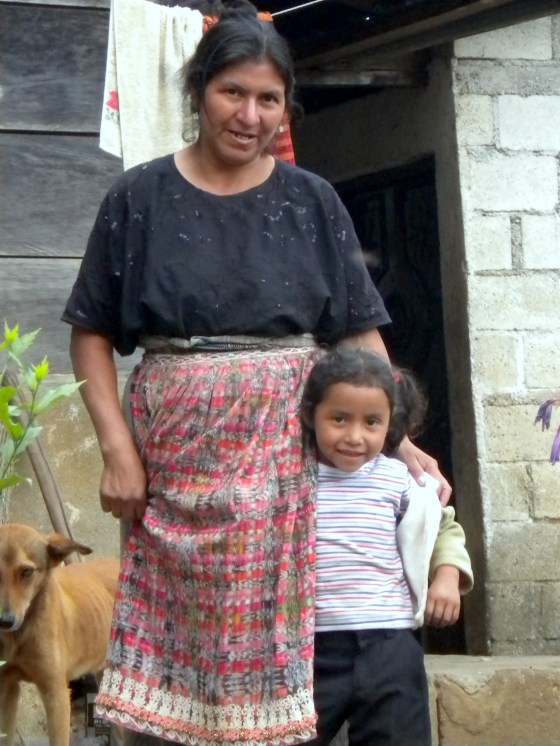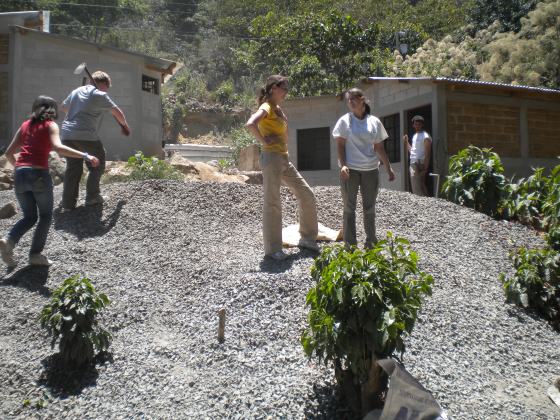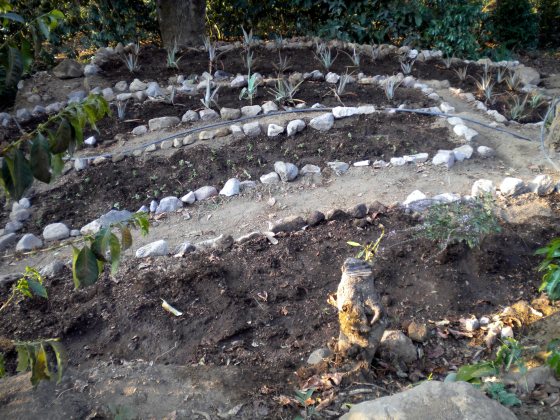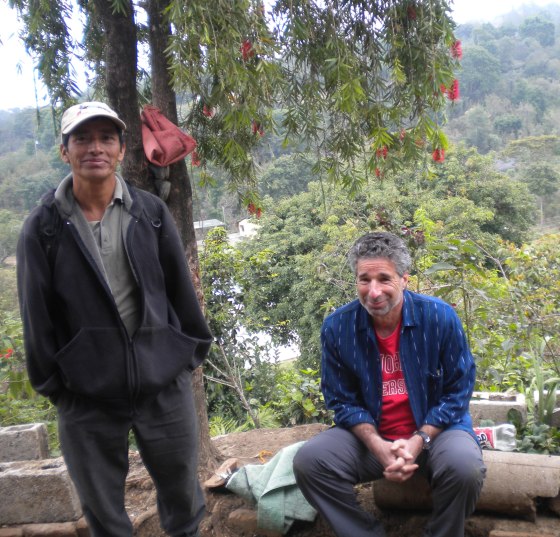For those of you who’ve never been on a service trip, this post may be a bit of an eye-opener. The idea of a home-stay, total Spanish immersion, 14-hour workday, alcohol-free, rooster-infused adventure is not for everybody – and by everybody, there have been plenty of times in the past six days that I mean me.
I’m on a week-long service trip with 10 students from my husband’s college to San Juan La Laguna, Guatemala. That means that every minute since arriving at the airport in Atlanta, I’ve been in constant interaction with people I barely know, and having to go with the flow of endless activities over which I have no control. For those of you who know me, you can imagine (actually you probably can’t) that I would voluntarily subject myself to such a situation. Yo tambien.
Yesterday, for instance, after a light breakfast of 3 pounds of wood-fired corn pancakes, sans syrup, I took a two-hour Spanish lesson, during which I was repeatedly reprimanded by my adorable but stern maestra Rosa for writing down words I was trying to remember while she was talking and giving me new words I couldn’t remember. Then, our well-tutored group was led to our daily service project: moving a 10-foot rockpile to the back of a site, so that the Mayan medicinal mujeres could plant their herbal healing plants on level ground. Did we have a wheelbarrow? No. Did we have gloves? No. Did we have a plan for where to put all the rocks we were hauling? No. Was I supposed to complain about any of this or offer constructive input about how to most efficiently conduct this back-breaking and seemingly preposterous work? Absolutely not.
I was supposed to just “go with the flow” and do what the mujeres were asking us to do –meaning that I ended up with an old frying pan on the top of the pile, scooping rocks onto linen cloths and old mesh bags that pairs of students would then carry to the back of the lot and dump into another big pile. I was so opposed to the inefficiency of our operation I thought I would lose my mind. And we did this for six hours. BUT…about 4 pm, there was a moment of perfect clarity – when the healing mujeres were standing there watching all us gringos work and talking on their cell phones – when it occurred to me, “Wow, this is how every landscape guy in Atlanta must feel about us dopey blancos!” Enlightenment!!
Then at about 5 pm, just about when my blisters were turning into open wounds, we started actually planting stuff. Suddenly, all the stones we’d moved, brush we’d hacked our way through with machetes, and plants we’d tuk-tuk’d down (my idea!) from the old location were put in the soil, watered, and we’d created a garden that would be used for years to help heal folks in the traditional Mayan ways. Wow!
That was pretty satisfying and I felt incredibly proud of our students, who had remained easy-going, cooperative and compliant (three words that have never been used to describe me) throughout the ordeal. When we got home I scrubbed out Larry’s and my filthy clothes (I may not be good with rock-hauling but I am awesome with the washboard), then proceeded to rip my leg open on a rusty piece of rebar on the roof of our house where the clothesline lives. Oops.
The next morning, while running down the road with four liters of water, I managed to fall between the bars of a grate covering a ditch, trapping my leg just above the knee. Unfortunately I saw 127 Hours and immediately envisioned having to hack my own leg off, but then I wrenched it out of the jaws of death and only caused a minor street spectacle of sympathetic onlookers. And luckily, we weren’t required to do any heavy lifting yesterday—only the usual five miles of uphill walking.
That day’s venture took us to a Heifer-supported project high in the mountains at the Asuvim organic coffee cooperative. This is a much poorer and more remote community than San Juan –and it’s almost impossible to overstate how hard life is for the indigenous people living there. The coffee cooperative allows farmers to buy coffee plants more cheaply; provides them with gorgeous organic compost made from discarded coffee pulp, manure, and some serious worm action; and helps them get the highest possible price for their crop. We toured the factory and new school, learned about Heifer’s work in Guatemala, spent some quality time weeding in the nursery & learning to love worms in a whole new way, then walked to two far-flung family farms to hear how the gift of a cow and microfinance loans have impacted their lives.
I lost my heart to a thin little girl in blue pants who grinned shyly at me from behind her dad’s leg, and I could hardly bear to think that she probably would never get the chance to go to school, much less have enough to eat. But that’s the hope of Heifer, and all we can do is give generously to those organizations that are here trying to make life better, passing on the gifts, and enabling these incredibly stoic and hard-working people to support themselves and their children.
We came home to supper last night (we’re all staying with indigenous families throughout San Juan), and while Maria made us a delicious supper of fried cauliflower, tortillas and French fries, I started worrying once more about the wood fires the people use to cook here – thinking about air pollution, deforestation, little kids’ lungs, and whether any of us gringos are ever going to get the smell of smoke out of our clothes, hair or skin. Then again, maybe the smoke will help us to remember every minute of our time here with these beautiful, dignified and joyful people.
Like the worms, I’m taking in big chunks of Guatemala and trying to chew my way through to understanding, wisdom and hopefully the ability to feed a few hungry people.
Hasta la huego, mes amigos!









Pingback: I _don’t_ smell like smoke since I use a Lorena stove « Dieterich at Diedrich's
Pingback: I don’t smell like smoke since I use a Lorena stove « Dieterich at Diedrich's
Betty, your posts are terrific and refreshing. I’m volunteering at Heifer Ranch (http://www.heifer.org/site/c.edJRKQNiFiG/b.201557/) outside of Perryville, AR this summer as an education facilitator, so I appreciate you covering a Heifer project. Your insight about the dangers of three stone open fires is important. To combat this Heifer works to provide appropriate technologies, those that cater to their location and communities in order to reduce work input, lessen the environmental impact, and provide new benefits to those communities while considering their cultural practices. There are many disadvantages of open fires: as you mention, air pollution, deforestation, _everyone’s_ lungs, and also danger of an open flame, required tending time. As an alternative Heifer teaches families and communities to build Lorena stoves by making bricks from sand and mud rather than buying an Ecocina stove. In this way Heifer is building self-reliance and sustainability. Lorena stoves have countless advantages. Because they are contained and have a large surface area, they require less resources to reach the same temperatures for cooking. By using less resources they decrease deforestation, air pollution, and the work put into gathering and chopping firewood. The contained fire also allows women, who traditionally do the cooking, to multi-task, and the large surface area allows more cooking to happen at once. This improvement aligns with Heifer’s focus on gender and family development by empowering women and raising their standard of living. Lastly the chimney of the stove protects individuals from smoke, lowering incidence of lung diseases.
Thank you for all of the work that you do directly in communities and indirectly by passing on the gift of your experiences to your readers.
Dear Toot — I really LOVED your comment — and how crazy is this? We went to dinner last night with the new CEO of Heifer, Pierre Ferrari and talked about Heifer projects all over the world! I love the Heifer model for building self-reliance and sustainability — as well as the Passing the Gift process, which also builds community! Such a great trove of information in your comment on the Lorena stove — I love that it’s made from brick, as I think the taste of cooking on an ecologically sound stove has to mirror the culture’s preferences — or else they won’t use them! Keep up the great work !!!
I’m jealous of you having dinner with Pierre Ferrari; I hear he is terrific. If you’re ever near Little Rock, you should definitely come out to visit the ranch. Or even make a trip to this area for that reason specifically.
What a transformational experience – thanks for sharing! Take me along next time, PLEASE!
Though I love the smell of smoke, can’t help but think solar ovens could be of great assistance with both cooking and water purification maybe not for pancakes, but certainly for rice and beans. Check out:solarovens.org
Kudo’s to you, Larry and Oglethorpe students on an amazing alternative Spring Break!
Laura you are totally invited on the next trip — no problema!! About the solar ovens – I thought about this a LOT while I was down there, and the one thing that made me wonder if solar ovens would be accepted is that the people make tortillas on the wood-fired stovetops … and I’m afraid would be super difficult to get the same wonderful cooking result with a solar oven. Hmmmmm … this is what makes introducing new technologies in any country such a challenge!
Betty: I love this posting. Your humor carries your message on wings.
Betty, you and Larry are true servants. Thank you for your continous support of ALL people great and small. YOU ARE MY HERO dear.
You just keep stretching yourself and changing the world, one piece at a time. Stay safe, Betty, and keep up the great work!
Thanks so much, BB — it was SUCH a great trip and it’s almost impossible not to get totally connected to the people of Guatemala. They are so full of hope, spirit, hard work, and generosity — and so proud of their culture! Lovely to hear from you!
wonderful experience — thank you for sharing ! hope you picked up some of the Mayan healing lore, perhaps you could start your own healing garden back home. I’m constantly humbled by learning what so many in the world have to deal with (smoky stoves) that we no longer have to contend with. I’m glad for the feed back from your readers (stoveteam). And what a grand way to connect with the students you went with, I’m sure many of them will make you proud in the years to come 🙂
Kudos to all!
How familiar this all sounds from my past expereinces in Guatemala and now just getting back from Honduras, but it all so worth it not for what we do while we are there but for what we learn. We must continually thank our gracious hosts for their giving us this learning opportunity.
Amen to that, Alicia — I’m so jealous you got to go to Honduras — absolutely next on my list! I miss the beautiful people there so much already; can’t wait to go back. There is just something so precious about that culture and those lovely families!
Very interesting post. Love your writing style. Hate to say it but my reactions would be the same as yours! Thanks for talking about Heifer — my Christmas present to my brother and his wife each year is a gift to Heifer. Thanks for sharing your experience in Guatemala.
I’ve been a big fan of Heifer for years, but seeing their projects in Guatemala in action was really impressive. SO happy that you’re a supporter, too, Susannah!
Betty honey, this is wonderful. Love what you’re doing… for all of us but better you than me with the hill climbing and unstructured way of working. Congrats to all on the results!
Guatemala will never be the same…nor will you!
What happens in Guatemala to fairly normally coordinated people like you and me (after all , I appeared with my girls field hockey team in Sports Illustrated back in the dark ages ) . I didn’t fall through a grate but walked blindly off a three foot high broken ledge in front of the old Pana Super the first month here …. wrecking my aging knees and killing the poor kid’s bicycle I fell on top of. That was only one of many such incidents. Our carpenter at the time took a look at my bruised and bandaged self one day and gave me some great advice. ” EEG, ” he said , “Eso Es Guatemala. Keep your eyes open , expect the unexpected and look where you’re going at all times.”
Honestly, it has helped. I haven’t hit my head getting out of the lancha in at least three weeks.
Safe journey home and hurry back.
Mucho amor y besos galore, Bonnie
Oh, Bonnie — wish I had had that piece of advice before I banged myself up so much! You’re so tall (especially by Guatemalan standards), I can imagine you constantly run the risk of walloping your head on something — but the fall off the ledge?? OUCH! Hey, we ARE sisters — I was All State in field hockey, too! But a photo in SI? Wowsa!!! Can’t wait to see you up here … or down there! B
Betty, I have really enjoyed your blogs from Guatemala! I am not sure who would fare better there – you or me. I am known to throw myself into things and then need first aide quite often :). Please keep sharing and I look forward to seeing you when you return and hearing them all again! Take care and remember to be careful.
Betty, we’ve enjoyed reading about your adventures in Guatemala. We know first hand of the hardships that many marginalized indigenous people face from our experience in helping rural communities around San Miguel de Allende, Mexico. My husband, John, is a Rotarian here in San Miguel and through collaborations with other Rotary Clubs and with the assistance of Stove Team International is trying to bring an Ecocina Stove factory to this area of Guanajuato State. You may be interested in reading about this great organization that is helping many folks in Central America cook in a more healthful way.
http://www.stoveteam.org/
Keep up the good work.
Hi Sharon! Will definitely check out the Ecocina Stove factory — such a great cause! I am so impressed with ALL the great work being down by Rotarians all over the world, in so many different aspects of good will. They really know how to get things done! If I’m ever in SMA, I will totally look you up!
Ohhh Betty I loved this post. I laughed & cried. I wish I were there with y’all. Thank you so much for sharing. C
Wish you were there, too, Catharine — we could have used another strong back! It was such a great trip — I miss those folks badly already!
I’ve always wondered what those trips were like and now thanks to you and your wonderful gift of description, I understand it all e.g.
“…after a light breakfast of 3 pounds of wood-fired corn pancakes, sans syrup..”
and “…the healing mujeres were standing there watching all us gringos work and talking on their cell phones…”
I’m usually the one falling in the ditch or scraping my knee on the one nail (I was the only one stung by a bee in South Africa) so I understand what you’re going through, and I’m sure the smell of woodsmoke in the future will take you right back to that wonderful place.
Thanks for your wonderful comment, Rosie — and I LOVE your descriptions of South Africa — wow! We’re both on the road lately!!
Dear Betty,
Thanks for the many laughs this morning, but also for the very perceptive and descriptive post – talk about being out of your comfort zone! Particularly liked the part about the 5 lb. pancakes…
take care – thanks for writing.
loved the post Betty! i completely identify with everything you have so eloquently and humorously described 🙂 enjoy the rest of your time! it will be over soon and while i’m sure you’ll be relieved to have a real shower, ‘real life’ back in Atlanta may not feel so ‘real’
Assuming you have your tetanus shots up to date and no infection has set in… we can then smile and enjoy your post. I wish to say how grateful I am for your words and the reminder that my load is so light. -jan-
Hang in there Betty! You’re doing great work and these posts are a lot of fun (to read). xoxo
Re: the smoke. Millions of people on our planet still cook over open fires and you well describe the unpleasantness of it. If you do it long enough it can cause respiratory disease. Plus the wood needs to be gathered, which is time consuming and eventually deforests the environment. A low cost effective intervention is clean burning stoves, sometimes called high efficiency or improved cookstoves. they are simple, geographically-appropriate apparatuses which use much less fuel and vent the smoke. Maybe you can look into them for the village you’re in when you’re stateside. They cost ~ $20 a unit.
Sitting here drinking coffee from ten thousand villages (will check the bag to see where it is from…) and stretching my joints after what I thought was a tough week at work. Not hardly! I’m going to push the button on the load soaking in the wash and picture you with a washboard.
Keep the stories coming, please.
oh, Betty! I laughed so hard tears ran down my cheeks. Thank you, thank you for sharing your Guatamalen stories. xoxo